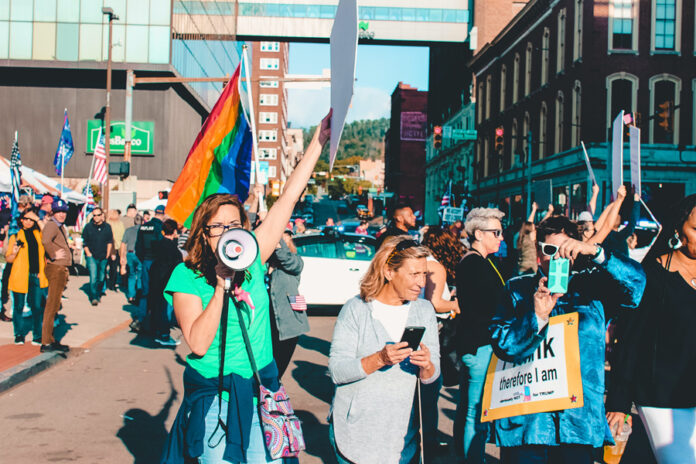The right to peaceful protest is one that we, members of an elective and representative democracy, often take for granted. Its existence constitutes one fragile strand of our otherwise complex and infinitely nuanced social fibre. Its significance is reflected through its enshrinement in the European Convention on Human Rights, under Articles 10 and 11, which expressly protect an individual’s freedom of expression and freedom of assembly and association. The introduction of the proposed Public Order Bill, which currently lays at the feet of the defanged House of Lords, infringes on these rights and threatens to destabilise one of the greatest catalysts for societal and political change in domestic history, the protest.
What is being proposed?
There are three main facets to the new proposed legislation:
Firstly, the bill introduces new offences for locking on (s.1), tunnelling (s.3 & s.4), obstruction of major transport works and key national infrastructure (s.6, s.7 & s.8) and interference with access to or provision of abortion services (s.9). The bill also introduces offences for being “equipped to lock on” (s.2) and being “equipped for tunnelling” (s.5).
Secondly, section 11 empowers officers to stop and search individuals whom they “reasonably believe” may commit of offence prescribed under s.137 of the Highways Act 1980, s.78 Police, Crime, Sentencing and Courts Act 2022 or under the bill itself. The officer may also conduct a search “whether or not the constable has any grounds for suspecting” that the individual is carrying a prohibited object.
Finally, we see the conception of a new preventative court order, known as the Serious Disruption Prevention Order, which targets “protestors who are determined to repeatedly inflict disruption on the public”. Such orders may prohibit an individual from entering a particular area or mixing with certain other individuals, possessing ‘particular articles’, or using the internet to encourage anyone else to commit a protest-related offence.
What does this mean in practice?
Even when one attempts to avoid traversing the political minefield nestled within the foundations of the proposed legislation, one cannot ignore its practical difficulties.
Initially, one does not require the trained eye of a legal practitioner to identify the potential issues relating to the drafting of the legislation and its incongruence with the government’s legislative aims. Let’s turn our attention to the drafting of the proposed offence of “locking-on”.
Section 1 states a person commits an offence of locking-on if:
(1)(a) they—
(i) attach themselves to another person, to an object or to land,
(ii) attach a person to another person, to an object or to land, or
(iii) attach an object to another object or to land,
(b) that act causes, or is capable of causing, serious disruption to—
(i) two or more individuals, or
(ii) an organisation,
in a place other than in a dwelling, and
(c) they intend that act to have a consequence mentioned in paragraph (b) or are reckless as to whether it will have such a consequence.
Where, in either section, has the government made any reference, implied or otherwise, to any acts committed during a protest? The government has cast its proverbial net so wide that even Joe Bloggs, devoid of political affiliation and entirely ignorant to the plight of fanatical eco-reformist, may find himself with a criminal conviction for chaining his bicycle too closely to the entrance of a Sainsburys in sub-urban Wiltshire. As flippant an example as this may seem, vague legislative drafting can lead to such obscenities, and it is often difficult to determine whether such equivocality is resultant upon genuine literary oversight or a governmental mandate to capture as many instances of “locking on” as possible. In any event, it cannot be in the public interest for Joe Bloggs to receive a custodial sentence for chaining his bicycle to a railing outside of a supermarket (s.1(1)(a)(iii)) and ‘recklessly’ (s.1(c)) blocking the main customer entrance (s.1(1)(b)(ii)).
Aside from the practical implementation of the new offences contained within the bill, the powers bestowed upon officers to stop search individuals, whom they believe to be in possession of a prohibited item, without suspicion (s. 11) raises more questions than it answers.
In a climate where public trust in the police force is so fragile, can the government, in good conscience, grant the police unfettered discretion to stop and search members of the public without suspicion? This is a question for political commentators and not one that requires answering within this article. However, as it is one that has legal ramifications, it is worthy of consideration. Although attracting criticism themselves, powers of stop and search with suspicion are commonplace in our jurisdiction (for example: possession of drugs (s.23 Misuse of Drugs Act 1971), firearms (s.47 Firearms Act 1968) or offensive weapons (s.1 Police and Criminal Evidence Act 1984)) and are widely accepted as a necessary vehicle through which police can effectively combat crime whilst respecting, insofar as possible, the rights of the individual. Section 11 proposes to upset this pragmatic equilibrium and usurp the very basis upon which searches conducted on suspicion are founded. One need look no further than ‘Operation Swamp’ and the events that led to the riots of 1981 to see the dangers relating to the legislative authorisation of arbitrary stop and search powers. Unfortunately, in the words of Georg Hegel, “The only thing that we learn from history is that we learn nothing from history”.
Preventative Court Orders are also commonplace in the criminal justice system. They act as a deterrent, armed with custodial consequences, for offenders who have been deemed as having a likelihood for recidivism. Conditions incumbent on offenders must be proportional insofar as they prevent reoffending and Serious Disruption Prevention Orders, in their proposed form, risk curtailing a protestor’s liberty in a manifestly excessive way. Pursuant to section 19, the court has the power to impose stringent conditions limiting an individual’s liberty to associate with others, access certain areas and use the internet. How, upon any interpretation of the legislation, do these conditions propose to prevent the commission of further protest-related offences in a proportionate and equitable way? The answer: they don’t. Let us revisit the case of Joe Bloggs. This time, Joe has recently completed his PHD on the revival and recent outbreak of Anthrax in the Artic Circle. In his thesis, he concluded that animal carcasses, once entombed in glacial coffins, have started to thaw due to an increase in global temperature. As they thaw, the Anthrax virus responsible for their deaths, which has laid dormant for countless centuries, has awoken and is spreading throughout the Northern Hemisphere. He chooses to attend an eco-awareness protest, with a group of his close university friends, to express his discontent. Whilst outside of the House of Parliament, Joe is searched without suspicion and arrested for carrying a fifteen-inch length of string (capable of amounting to a prohibited item under section 2) which he had in his pocket from his recent arts and crafts evening with his niece. Joe is tried and convicted of being equipped to “lock-on” at the magistrates’ court and the court imposes a Serious Disruption Prevention Order. By exercising his right to protest in a peaceful manner, Joe Bloggs now has as a criminal conviction, and:
- Is unable to see his university friends with whom he attended the protest,
- Is unable to go to the city of Westminster (the heart of the nation’s capital),
- May not use the internet to read articles relating to “global warming”, “eco-awareness” or “protests”, whether for academic purposes or otherwise.
Once again, although this example may seem extreme, such cases are within the realms of real possibility and in fact probability, subject to the way in which the courts choose to wield this abhorrent axe. The tragedy that has now befallen Joe Bloggs is one that results from the imprecise drafting of excessively punitive legislation. There is a pattern here and it is mosaic.
Conclusion:
At the time of writing, the proposed Public Order Bill is just that, proposed. It may be subject to further amendment and revision which, as Joe Bloggs will attest, is desperately needed. The bill is too loosely drafted, criminalises the exercise of a right under the ECHR and curtails the liberty of an “offender” too stringently. If the House of Lords loses their game of Parliamentary “ping-pong” with the Commons, there may be only one way to pressure the government into eradicating the bill in its entirety. Considering the nature of the proposed bill, I’ll allow you to use your imagination to determine what that is. I have no interest in following in the footsteps of Joe Bloggs.
James Bull, Pupil Barrister at 15 NBS




